10 Years after the Earthquake
Unprecedented earthquake struck Sichuan Province in China in 2008. Although KOBELCO CONSTRUCTION MACHINERY GROUP's base of operations in Chengdu City was also damaged, we focused our efforts not only on the restoration of our own company but also on the recovery of the local community. As assistance efforts continue, a CSR Committee was established based on the opinions of our employees. Although the format has changed, we have continuously contributed to society during the ten years since the earthquake. We take a look back at this historic earthquake that caused much emotional damage and also marked the beginning of many important revelations.
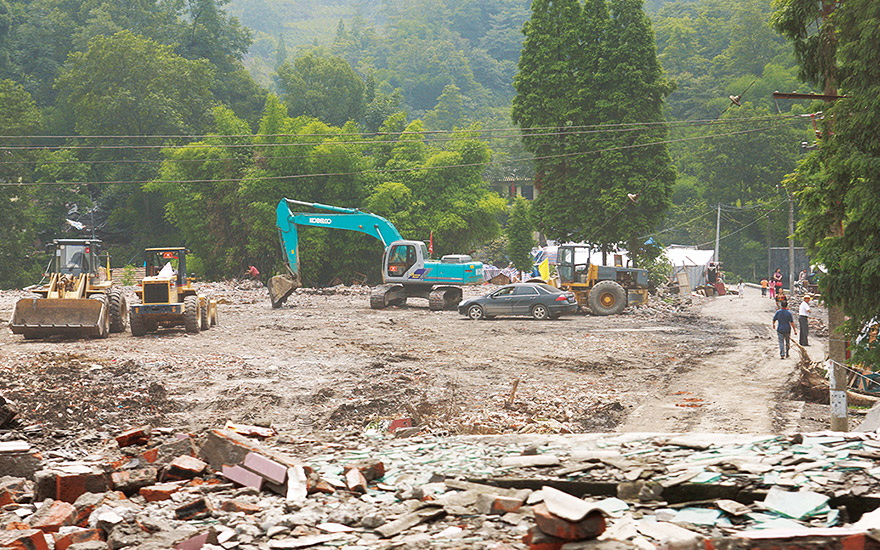
We Take Our Mission as a Construction Machinery Manufacturer to Heart
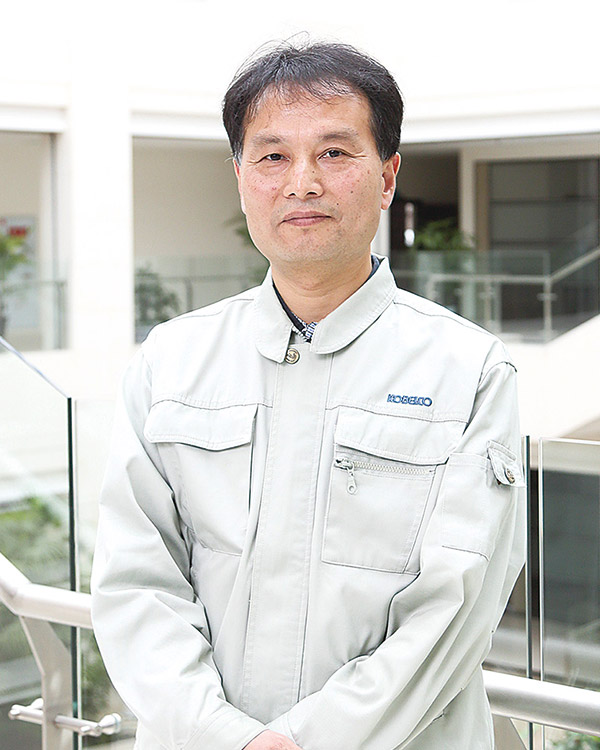
KOBELCO CONSTRUCTION MACHINERY (CHINA) CO., LTD.
Deputy GM, AS Div.Li Chaoyang
On May 12, 2008, a massive earthquake of magnitude 8.0 struck Sichuan Province in China. The region was devastated and two operational bases of the KOBELCO CONSTRUCTION MACHINERY GROUP in Chengdu City, 90 km from the epicenter, were also damaged.
Gratefully, our company suffered only minor damage, and we were able to restart operations with astounding speed, thanks the sense of responsibility and cohesiveness of our employees. At the same time, we were actively involved in recovery assistance in areas affected by the earthquake. KOBELCO immediately provided construction machinery and donated money for assistance. However, our most unseen efforts were put into supporting of construction machinery to operate continuously in the affected areas. We talked with Li Chaoyang who served as the Earthquake Recovery Team Leader. "Our responsibility as a construction machinery manufacturer is to produce excavators that are essential for recovery operations and support their operation. That is our form of recovery assistance." Service personnel were dispatched to the various areas affected by the earthquake. They stayed on site in order to be able to respond to any problem, and it occurred with everyone living out of tents for at least a month. Our actions to achieve recovery as quickly as humanely possible for the benefit of the earthquake victims coincided with the philosophy of the CSR activities of the KOBELCO CONSTRUCTION MACHINERY GROUP that promotes consideration for both individuals and society.
Results of Recovery Support Activities
Assistance for Areas Affected by the Earthquake
For Chengdu City, seriously damaged by the earthquake, we donated two hydraulic excavators (20-ton and 25-ton classes) and four wheel loaders the day after the earthquake to provide assistance for recovery work in affected areas. KOBE STEEL and the entire KOBELCO CONSTRUCTION MACHINERY GROUP contributed 1 million yuan to support recovery efforts.


Rebuilding and Assistance for Qingxing Shengang Primary School
We participated in plans for the rebuilding and restoration of damaged elementary schools in Chengdu City, and rebuilt a primary school damaged by the quake in Pengzho City. A new school building opened to classes in September 2009, about one and half years after the earthquake. We also contributed fixtures, playground equipment, and other school furnishings, and have been providing continuous assistance since that time.

(2009 to 2017)

Tree-Planting Activities
We participated in tree-planting activities in the area in order to repair and reinforce mountains that collapsed due to the earthquake. In 2011, KOBELCO collaborated in a joint project of the Japan International Cooperation Agency (JICA) and Sichuan Province, after which a great number of employees took part in tree-planting ceremonies in various communities, and we continue to actively carry out forest protection activities.

(2011 to 2014)

Support of Our Partners

Sichuan Great Huaye Construction Machinery Co., Ltd.
PresidentYuan Hongmeng
Distribution agent for KOBELCO since 2001. The company has 105 employees and six branches in the Sichuan region.
Assistance Details
24-Hour Free Repair Service / Parts Provided Free of Charge / Monetary Donation for Assistance
Repairs and Parts Free of Charge to Keep Excavators Operating
We happened to have three service persons in affected areas when the earthquake struck. After hearing about the conditions, I told them to stay in position as we dispatched more service personnel to the affected areas. A dozen of service personnel stayed in tents as they responded to problems with construction machinery in affected areas. Both repairs and parts were free of charge. Because there were some areas where only military and other related personnel were allowed to enter, we instructed military personnel on-site about the features of the machinery so that they could operate them appropriately. Out personnel drove around in cars to provide repair services, stopping to talk with KOBELCO machinery operators when they met, then sometimes providing them with repairs and parts right then and there.
We also tried to help customers who came into our branches to buy parts, by providing them with anything that might help them in their recovery efforts free of charge. We loaned out excavators with more predicted replacement parts than usually thought necessary. We provided as much support as possible to make sure that construction machinery in the affected areas could continue operating. Our attitude was that we had to do whatever we could to help.
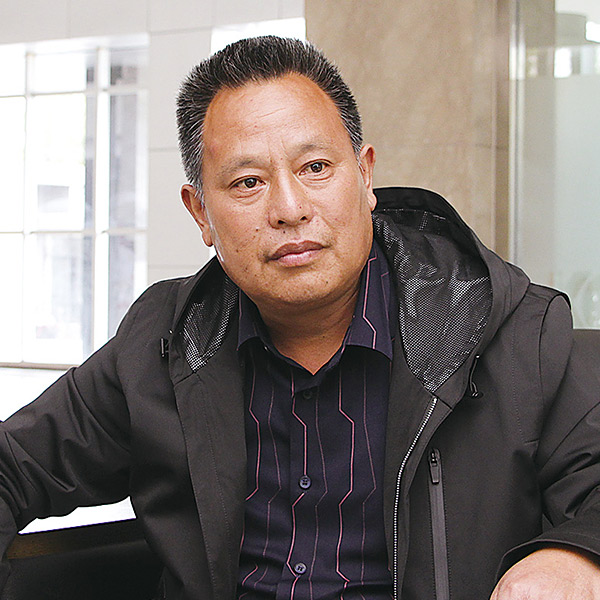
Pengzhou Xinhui Construction Machinery Leasing Co., Ltd.
PresidentWu Yunfu
Started operations in 2008. Currently has seven staff members with three mid-size excavators for various work sites.
Assistance Details
Machinery Provided Free of Charge / Rescue Residents / Clear Rubble / Repair Roads
Participation in Rescue/Recovery Activities in Affected Areas under Military Command
My house and company are in an area affected by the earthquake, and rescue and recovery work were started under military leadership immediately after the earthquake. So, we volunteered our services and worked under the command of the military. First we rescued buried people using excavators to clear away the rubble of collapsed buildings. For one week immediately following the earthquake, machine operators worked in shifts to continuously search for trapped survivors and we rescued some people. After that, we repaired roads. Even though all the fuel was provided at our expense, our driving force was the feeling that we had to do something to help.
One time I saw the river water increased, leaving some people stranded on the opposite bank. As the flow of the river became faster and the bottom of the river was filled with rubble, people got on the back of the excavator to be rescued. Because the construction machinery are tall and can easily traverse damaged roads. The excavator went back and forth numerous times to finally rescue more than 100 persons. I am really proud our excavators for performing various tasks in such catastrophic conditions. They serve as important partners in our life.
* Names of departments are those when originally reported
From the Front Lines of Recovery Assistance
Construction machinery is indispensable for recovery from an earthquake. However, transporting machinery into mountainous area struck by an earthquake is dangerous, and operators have to work under the harsh environment.
Let's listen to what some employees who provided unheralded support for our excavator assistance to affected areas.
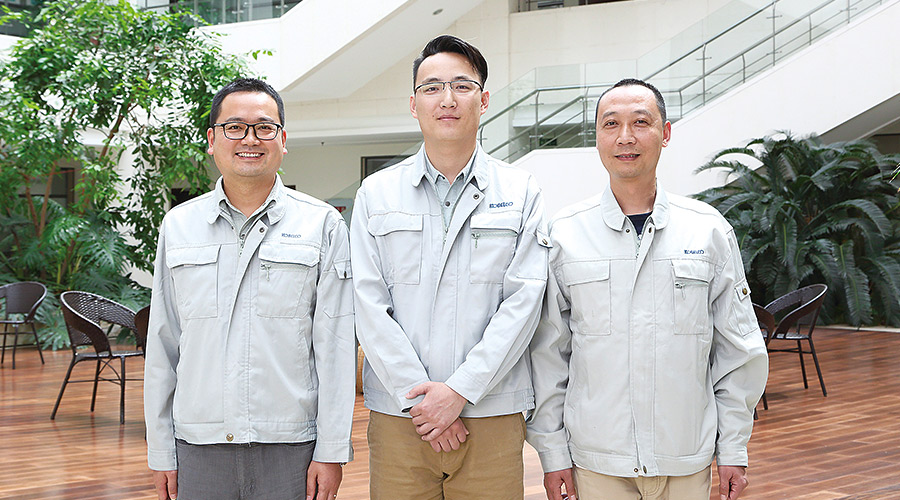
From the left:
KOBELCO CONSTRUCTION MACHINERY (CHINA) CO., LTD.
Engineering Sect., Engineering Dept., AS Div. Xu Cong
Parts Planning and Sales Sect., Parts Dept., AS Div. Cheng Yanwei
Product Management Sect., Sales Admin. Dept., Marketing Div. Jiang Chao
Tremor Felt Even 1,000 km to the East
Where were you and what were you doing when the earthquake struck?
Sending Excavators to Earthquake-struck Areas
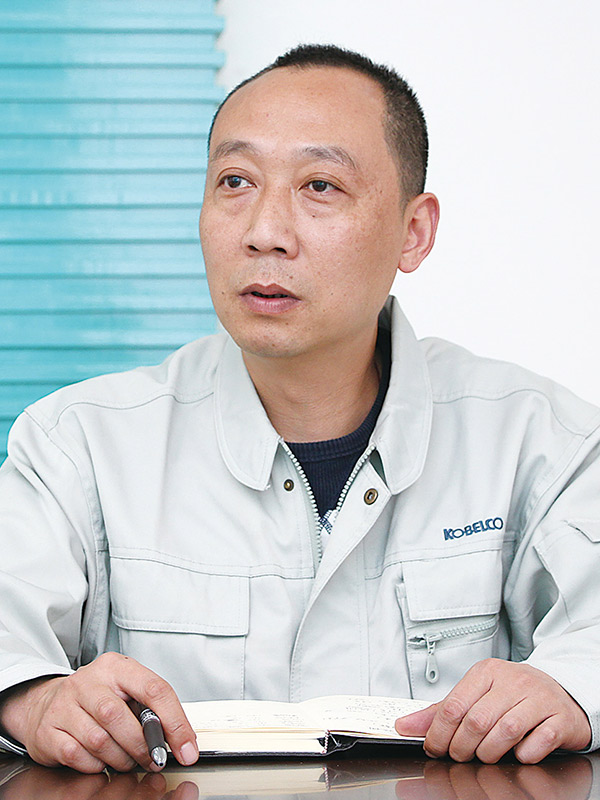
Tell me about the disaster recovery support that each of you worked to provide.
Jiang: The first support provided by the KOBELCO CONSTRUCTION MACHINERY GROUP was in the form of SK260 units and wheel loader that were donated on the 16th, the day after we restarted operations. I was responsible for getting this machinery delivered to the affected areas. Although it wasn't a donation, we also received an order from the government for 17 compact excavators. As the earthquake struck mountainous regions, there were many areas where large excavators could not be brought in due to landslides and collapsed roads, so there was a need for a great number of small construction vehicles. I was responsible for the transport of the 13 vehicles we shipped from Chengdu on May 20.
Xu: And I was responsible for the procedures to bring the remaining four vehicles in from Shanghai.
How was transporting machines into the earthquake-affected areas different from what was normally required?
Jiang: We used seven transport vehicles, each carrying two excavators, and with two front and back guide vehicles, making for a convoy with a total of nine vehicles. Although we normally do not use guide vehicles when transporting excavators in China, we used them here at the front and back of the convoy due to the dangerous conditions of the roads, and I was in charge of providing guidance for the journey.
What about activities for service support?
Cheng: On May 20, we gathered service personnel from various areas in Chengdu. Before that, our company had investigated the status of all 187 excavators in the affected areas and dispatched two-person teams of service personnel to each earthquake-struck area. I also loaded a service vehicle with parts and tools, and went to the sites where work was being performed. After repairing and servicing machines damaged in the earthquake, I stayed overnight at the work site to provide support for construction machinery so that recovery activities could be performed without interruption. I lived in tents for some three months.
Xu: I went to affected areas together with service personnel from our distribution agents. The excavators were working at full capacity, clearing rubble, rescuing people, repairing roads, and many other tasks. We worked very hard because recovery would become stopped at a site if construction machinery stopped working.
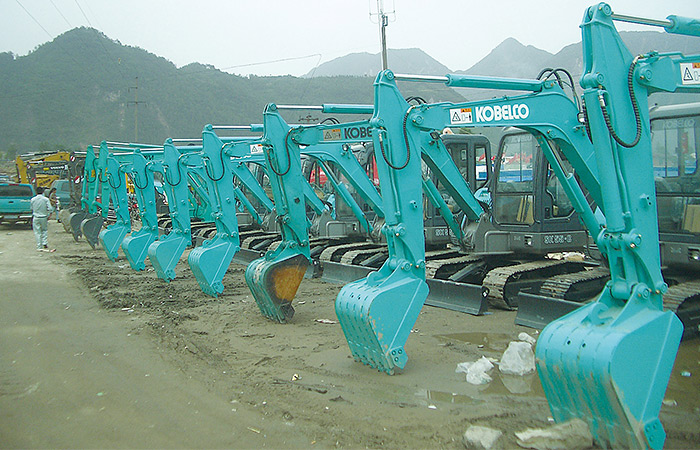
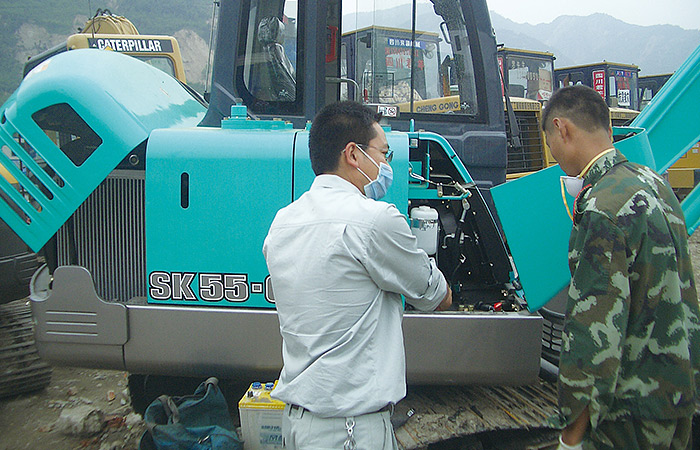
Excavators Operating in a Rough Environment
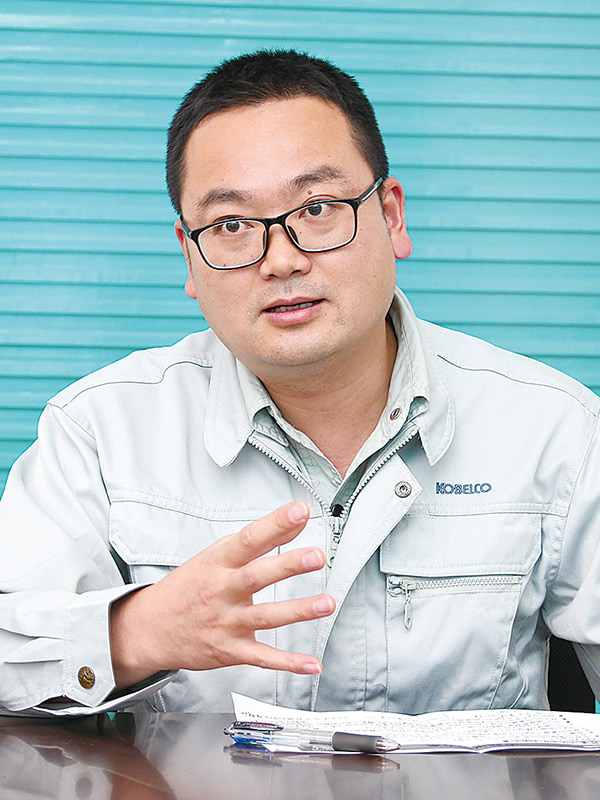
How were the machine breakdowns and problems different from what you normally deal with?
Cheng: Notable damage in that regard consisted of objects that had fallen on or collided with an excavator. Normally, we rarely have to deal with problems like crushed hoses, but we saw a lot of that from the earthquake.
Xu: Because we operated non-stop in the unusual post-earthquake environment, much of the construction machinery operating in the affected area had been damaged. But, since we had to find some way to operate the excavators, we overused them in severe conditions. There was a shortage of fuel forcing us to use poor quality fuel. Oil became thick and pitch black, and hose seals were damaged, resulting in oil leakage. The rubble, dirt, and dust were so heavy that oil filters would soon become clogged.
Jiang: We had no choice but to operate excavators even if it meant damaging the machine. When I was helping transport excavators, we came across half-collapsed roads where construction machinery was parked waiting for repair. We worked night and day every time there was something damaged.
Xu: Everybody felt the same way. Our number one thought when making repairs was to get them done as quickly as possible.
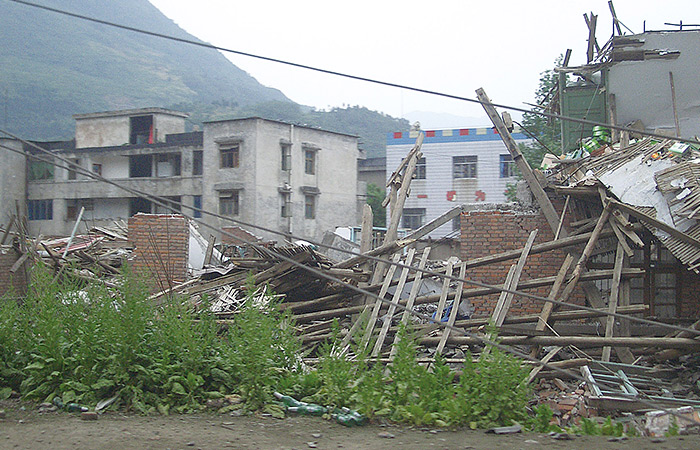
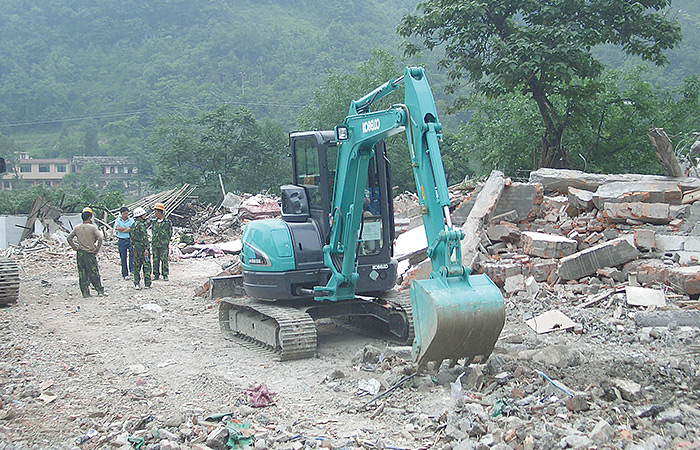
Assistance on the Edge of Danger
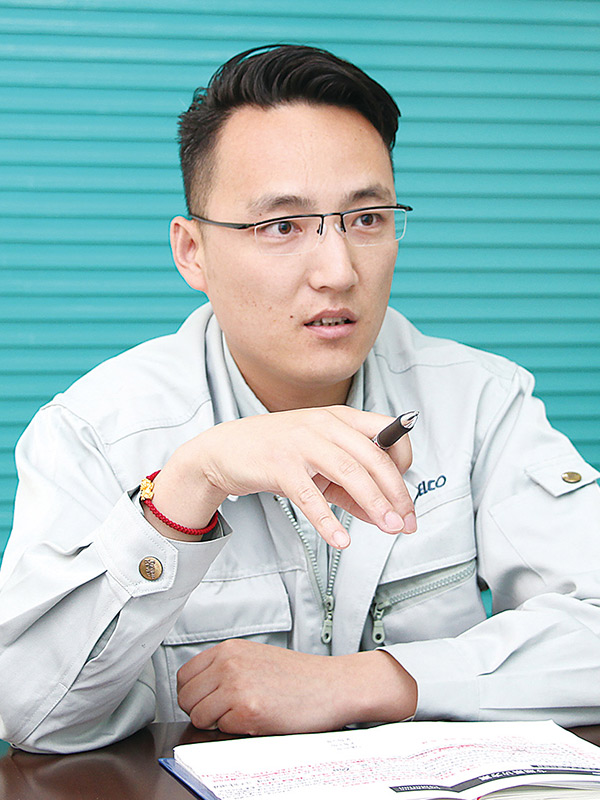
Were there any dangerous or difficult situations?
Xu: There were many cracks in dams and landslides, with one dammed lake that seemed like it was going to burst. The water level steadily became higher as the days passed, resulting in people having to be evacuated from some areas. I felt a bit uneasy as I was working at a site nearby that dam.
Cheng: The severed roads all over the place forced us many times to stop the vehicle and continue walking to the work site. There was one time when we couldn't return to the vehicle after repairs were completed because a landslide had occurred blocking the return trail, so I ended up having to walk some 20 km. The large number of aftershocks also made many roads unusable. The huge amount of mosquitoes was also a nuisance (laughter).
Since roads were impassable, it must have been dangerous to transport the excavators.
Jiang: Although there was great danger from landslides and other bad road conditions, we were luckily not involved in any serious accident. However, it did require more time than originally thought. Transporting compact excavators to some 200 km from Chengdu normally requires three to four hours, but we had to make detours due to the roads made impassable by the earthquake, and occasionally we encountered detour routes that had collapsed. We were constantly facing the damaged roads. The road was repaired so the vehicles could pass, then we encountered another collapsed area, repaired it... Due to continuously repeating this cycle, it took us four full days to reach the affected area. The affected area was also chaotic, resulting in it taking us three days to complete delivery and then two days to return, driving through the night. It should have normally taken one day to perform, but ended up taking some 10 days.
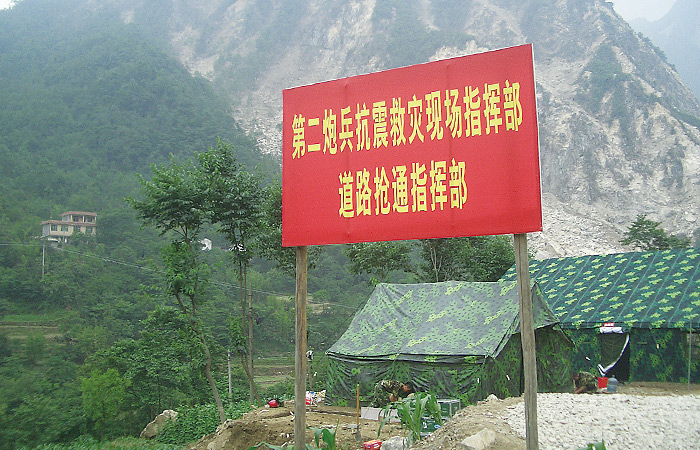
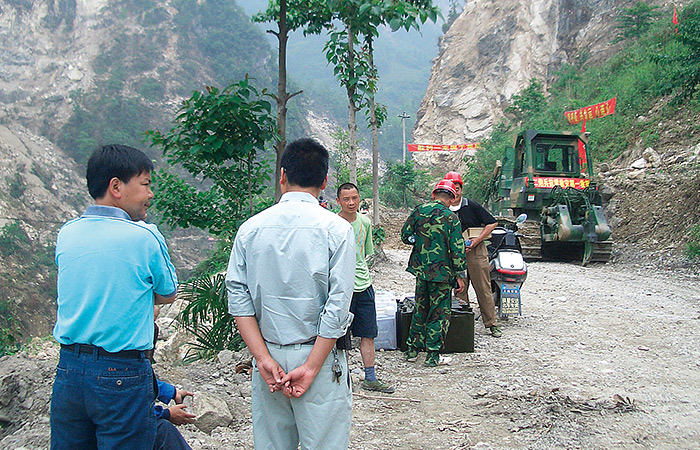
Consideration for People and Society
How do you feel now about your disaster recovery support efforts?
Jiang: In China, the military first enters the dangerous affected areas. When residents see the military, they know that they have come to help. They are followed by excavators. I was so happy when an earthquake victim said to me, "I felt relieved when I saw the excavators." Although building houses and roads is certainly "exciting", I was really moved by hearing that excavators could provide other people with a "feeling of relief". I felt I made a new realization about the signifi-cance of the existence of excavators.
Xu: There was a shortage of fuel in the affected areas. KOBELCO excavators can operate longer than those of other manufacturers on the same amount of fuel. Thinking about that, it seemed to me that this meant they made an unseen contribution.
Cheng: Although KOBELCO CONSTRUCTION MACHINERY GROUP is the only company I have worked for since I graduated university, I was able to gain a sense of how our company is one that values people on a regular basis. I feel that this was fully demonstrated in our earthquake recovery assistance activities. Although there were many companies providing assistance centered in Chengdu and other nearby towns, I think that only KOBELCO was capable of transporting parts and machinery to the relief work sites, and camping out to provide support for construction machinery.
Jiang: Although the KOBELCO CONSTRUCTION MACHINERY GROUP has always been a company focused on improving environmental awareness by low fuel consumption and other ecologically oriented measures, I personally had never thought much about it. But the earthquake made me really think about people and the environment. We formed a CSR Committee that I believe will allow us to provide assistance with an even more fully prepared system if something similar occurs in the future.
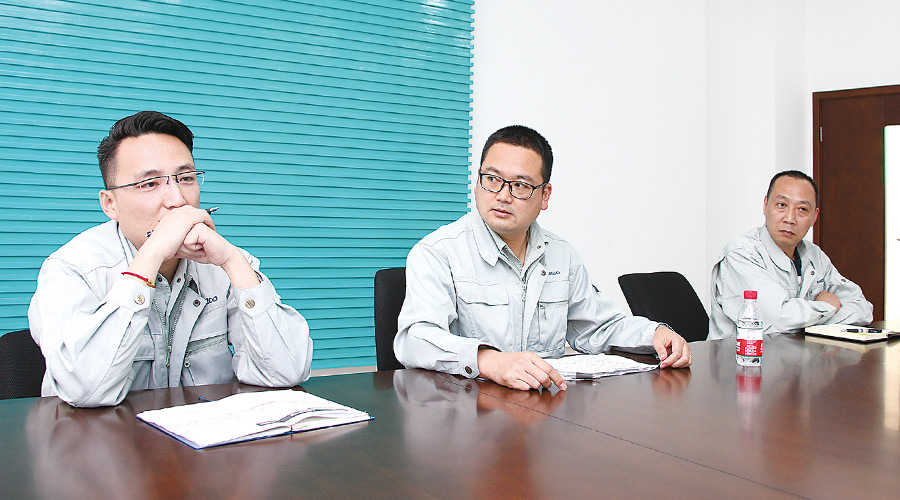
Rapid Restart of Operations through Cohesiveness and a Sense of Mission
KOBELCO CONSTRUCTION MACHINERY (CHINA) CO., LTD. was the first company in Chengdu, where many manufacturers struggled to recover factory operations, to restart operations. We talked with the employees who lead the efforts to return the factory to an operational state about what that period was like.
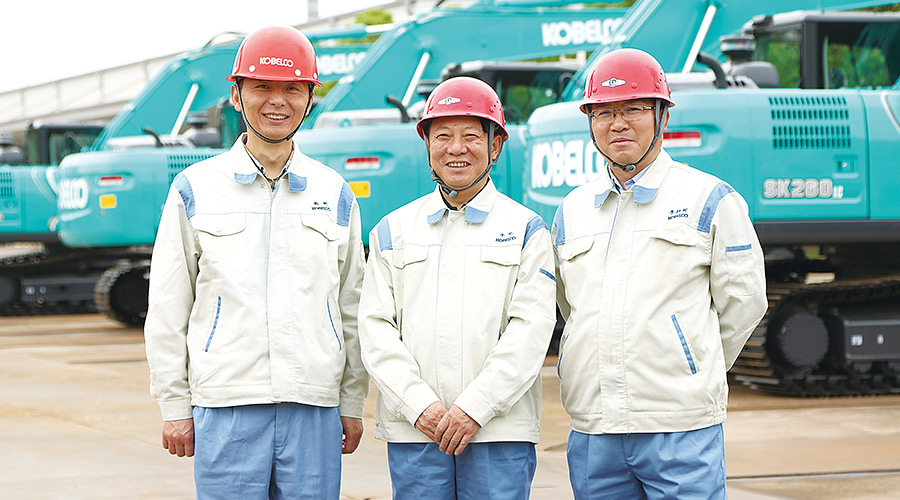
From the left:
KOBELCO CONSTRUCTION MACHINERY (CHINA) CO., LTD.
Factory Manager Jing Ling
Executive Vice-GM Li Ping
Vice-GM Li Xiangfu
Li Ping (Executive Vice-GM), Li Xiangfu (Vice-GM; Factory Manager at the time), and Jing Ling (Factory Manager; Assembly Sect. Head at the time) look back on the period after the earthquake.
Terror of a First-Time Earthquake
What was it like during the earthquake?
Li Xiangfu: I was in the office. I was just in front of the machinery parking lot, so when the earthquake occurred, at first I thought it was vibrations from the machine. But as the shaking continued, I thought, "This is odd." Once I realized it was an earthquake, I quickly ran outside. Seeing the pond water undulating from the quake made me quite scared.
Jing: I was in the middle of a meeting with Japanese staff when the shaking started. I had never experienced an earthquake, so I thought it was a car crash or something. When I saw the Japanese get under the desk, I just followed them, but the severe shaking of the building was terrifying. I thought it was going to collapse. The shaking lasted a long time and seemed quite dangerous, so all the employees went outside. After it was over, no buildings were destroyed, although the outer wall was peeled away in places.
Li Ping: I was not in the company but rather in the hospital when the earthquake struck, but I appropriately got in contact and received a report.
Concern for and Communication with Coworkers
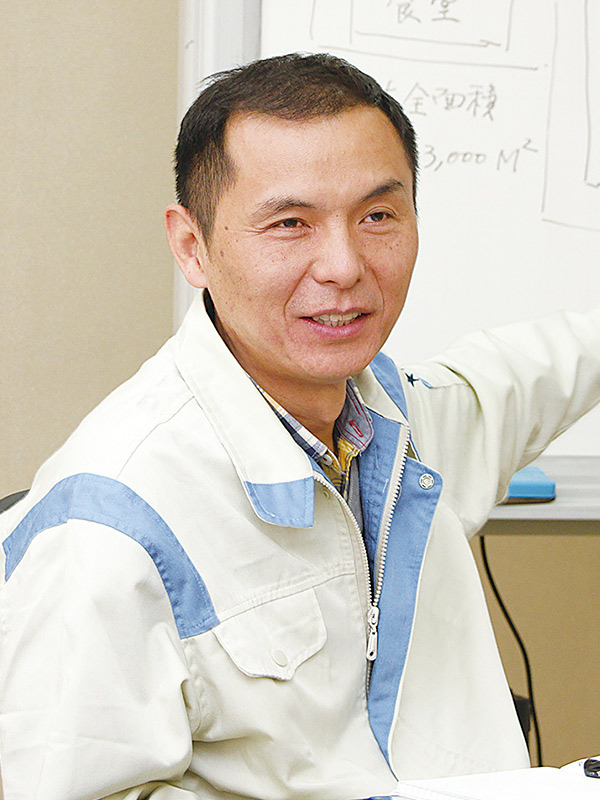
What did you do after evacuating?
Jing: First we met somewhere away from tall buildings to check that all employees were present and accounted for, and whether there were any injuries. We decided that the continuous aftershocks made it dangerous to move and stopped operations for the time being. We spent about two hours like that, helping and consoling each other. During that time, management personnel gathered together to discuss the situation.
Li Xiangfu: Since we didn't know what conditions we were, as the telephone and Internet were both out, we created a response team right then and there, and all the other employees were sent home. There were some 30 employees that remained including the leaders of each section and department, and personnel in charge of facilities and of safety management.
Were you able to safely provide leadership?
Jing: Everyone was panicked, but I think that everyone's initial response was rather spontaneous in such cases. I didn't need to tell anyone to check the safety of coworkers and similar actions because all employees started to check on each other by themselves. Next, we checked everything again while also turning off the factory gas and high-voltage power in order to prevent any secondary accidents.
Li Xiangfu: There was great solidarity with everyone maintaining their composure. After returning home, employees were told to take three days off in order to take care of their homes, families, and persons close to them, while the response team worked to ascertain conditions, and dealt with matters within and outside of the company.
Steps Towards Restarting Factory Operations
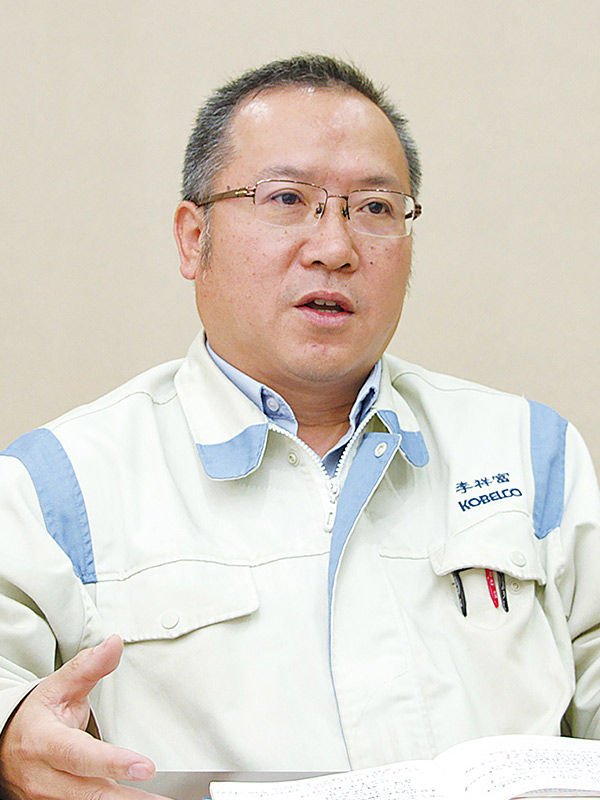
What did the response team do?
Li Xiangfu: Starting from the morning following the earthquake, we checked on the damage status of our distribution agents and users in affected areas and examined all the machines we had shipped to find out if they had suffered breakdowns or other problems. This was our first priority as construction machinery in the affected areas serves as a lifeline.
Jing: We set up a response headquarters in the gym and stayed overnight there in shifts. As it was also used as an evacuation center, there were some 20 to 30 persons, employees and their families who were too scared to sleep in their homes, staying there at any time. We carried out night patrols from immediately after the earthquake until early June.
Li Xiangfu: To recover factory operations, we mainly checked the safety of the buildings, investigated the safety and functions of the factory facilities and equipment, and coordinated their operations. We worked quickly but it still took two whole days.
Jing: Although we wanted to restart operations as soon as possible, we had to pay particular attention to equipment ensuring quality. As it is essential to maintain quality at all times, various equipment manufacturers dispatched personnel to our factory so that we could perform an overall inspection. It is more difficult to examine already installed equipment than when newly installing it.
Our Mission as a Manufacturer
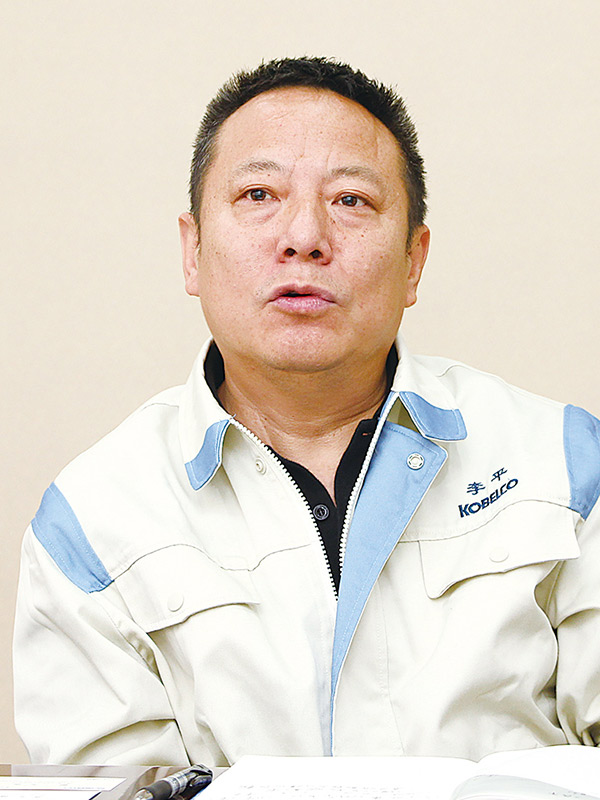
Tell us your thinking about restarting factory operations from the perspective of a company director.
Li Ping: Construction machinery is essential for helping areas affected by an earthquake. As this earthquake happened near us, it was necessary that we restart production in order to quickly provide for the needs of people in affected areas. Assistance in affected areas was being performed by the KOBELCO CONSTRUCTION MACHINERY GROUP, so we could maximize our efforts to restart factory operations.
Li Xiangfu: We asked our employees to understand our responsibilities and mission as a factory member, and morale rapidly grew increasingly higher. I think the general consensus among employees was "Even just one more machine!"
Li Ping: Of course, the first priority in an earthquake is human life, but economic recovery is also necessary for returning to regular daily life. I believe that our mission as a manufacturer is to restart operations and restore economic activity.
Li Xiangfu: I was in Japan during the 1995 Kobe Earthquake. At the time, KOBE STEEL could not make some parts due to earthquake damage, so they were provided by other companies, enabling KOBE STEEL to deliver the products ordered by their clients. This was because, even if a loss is suffered, carrying out nearly normal transactions helps to keep the economy circulating in a regular manner. That also really impressed me deeply.
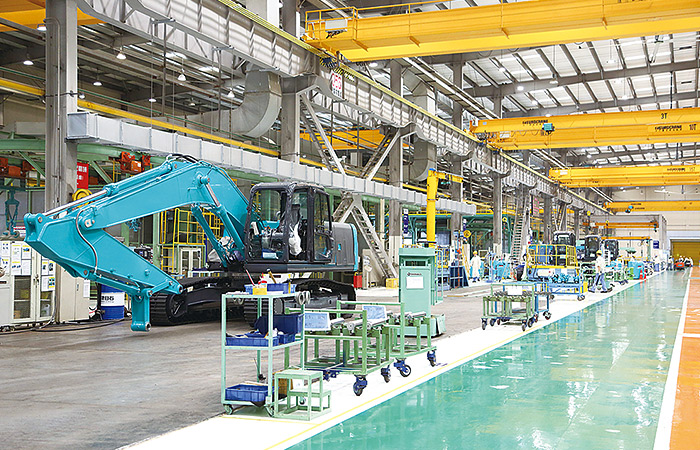
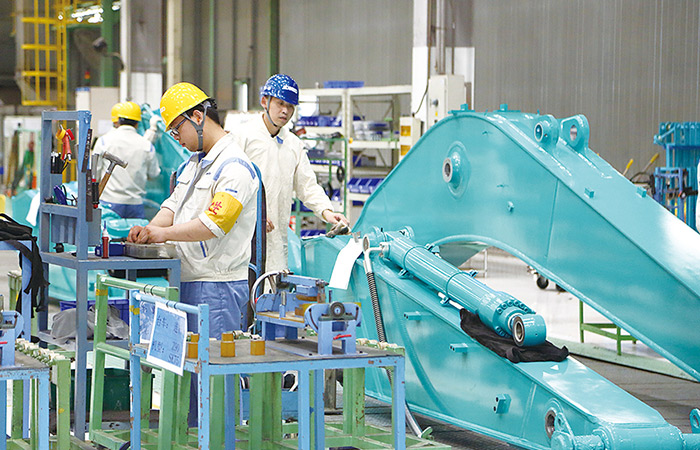
Compassionate Corporate Culture
Newly reflecting on your experiences, how do you feel about them now?
Li Ping: KOBELCO CONSTRUCTION MACHINERY GROUP received a commendation from the city for responding so quickly to provide assistance in the earthquake-struck areas. The employees also raised quite a large sum of money from a donation drive they initiated themselves. I was able to really feel the cohesiveness of the KOBELCO CONSTRUCTION MACHINERY GROUP, as well as the caring environments of our company.
Jing: Instructions and coordination were carried out smoothly, and I feel that the rapid recovery was certainly due to the solidarity and mutual cooperation of our employees. The strengthening of unity between employees has become a great asset for us.
Li Xiangfu: Although I didn't directly work in providing disaster recovery, I was able to play a role in restarting factory operations. Our company helped employees and suppliers affected by the earthquake and showed great consideration and kindness for not only our employees but also related companies and local communities.
Li Ping: I feel that confidence in our company increased greatly not only among our employees but also from people outside of our company. We received words of gratitude from many people. Additionally, the attitude of contributing to society was greatly strengthened in our employees. The earthquake was used as an opportunity to create a CSR Committee that continues to provide assistance to universities, primary schools, and other organizations. I hope that we can achieve coexistence and mutual prosperity with the local communities as a company that is considerate of both people and society.
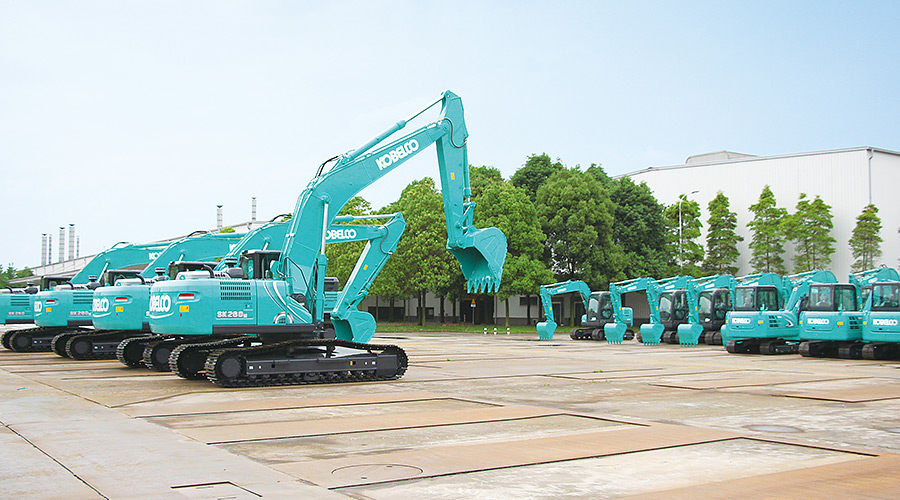

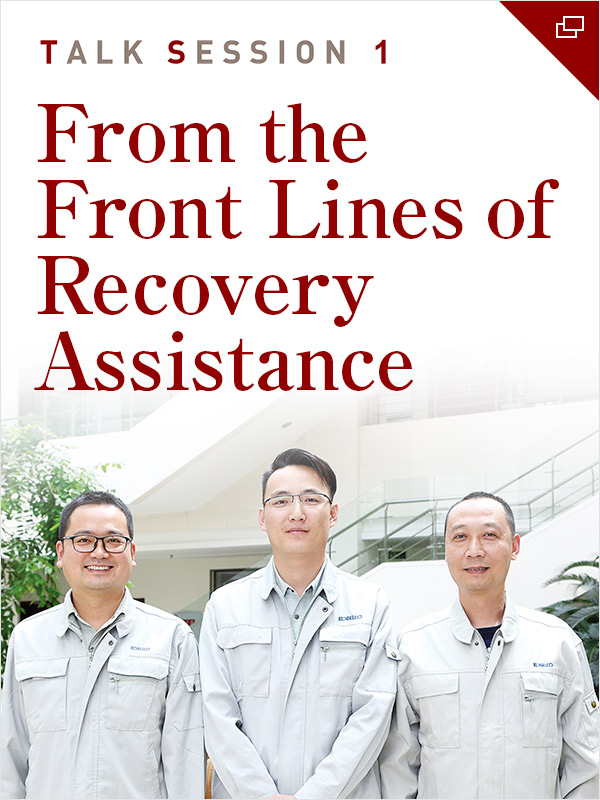
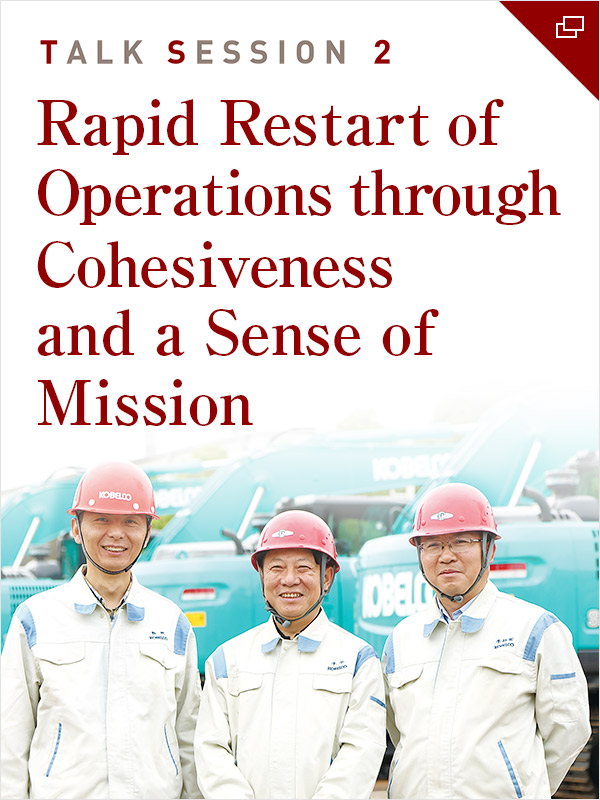
Xu: I was engaged in service-related work in Hangzhou (150 km south west of Shanghai). I felt the tremor just as I started to do some work in the office, so I checked on the Internet immediately and was shocked by the news.
Cheng: I was also performing service work by extracting machine data on-site in Shijiazhuang (200 km south west of Beijing). I didn't notice the earthquake but it shook a little. I learned about it when I returned to the office and saw the news. I simply could not believe it had really happened.
Jiang: I was performing logistics management in the Marketing Div. in Chengdu. Although I was in the building when the earthquake struck, the building shook so hard that we all panicked and went running outside to take refuge. It was quite frightening. Our company was closed for three days and reopened from May 15.